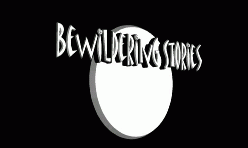Bewildering Stories Editorial
by Jerry Wright
Right Writing Rites
In the past, we've had various articles about the need for Story, y'know, plot, character development and so forth, and these are critically important. But there are some other things that take your story from the realm of amateur night to that of becoming a professional. And that is those ugly little things called "the mechanics of writing".
Do you know how to spell? Do you trust your Microsoft spellchecker to tell you whether something is spelled correctly? (bwa ha ha ha ha!!) Do you know how to form a sentence? A clause, a phrase, a paragraph? Can you punctuate? Do you know where to place a semi-colon, or a colon?
Do you have a copy of Strunk and White's Elements of Style?
If you want to join the big leagues and pass beyond Bewildering Stories (or for that matter even into the pages of BwS) these are things that you MUST know.
Plus do your descriptive powers fall short of making sense? A section from Maya Kaathryn Bohnhoff's article on writing wouldn't be remiss here:
I don't think that means what you think it means
Moving further along on our perilous adventure, we come to a hazard far more common than it ought to be: the misuse of words. By that I mean a writer uses a word that is either flat-out wrong or just to the left of 'right.' Here's an example: "A pillar standing directly adjacent to the hatchway bore a number of indentations in its surface, indentations which looked well-worn from age-old use by men of yore."
Clear as mud. A hatchway is something usually found on a vessel. That the pillar is adjacent to it indicates they are side-by-side. There are indentations in the pillar; I pictured shallow depressions, possibly hieroglyphics. The purpose of these was a mystery until I read on: "Valliard put his hands to the indentations, and so climbed swiftly up and through the hatchway." The hatchway was a trapdoor in the ceiling, the pillar wasn't adjacent to it, it was beneath it; the indentations were handholds.
Let's navigate that passage again: "A pillar descended from the ceiling next to the trapdoor, its surface marred by a series of age-worn hand-holds." This is more concise, clearly describes the scene, and tells the reader that this secret entrance is old and much used.
A close personal friend of word abuse is having characters make inappropriate (and sometimes comical) responses to the things that befall them.
A character in one harrowing tale has this reaction to the cries of torture victims: "I wish I could do something about that," he said crossly. The scene is memorable, but not for reasons that would please its writer. "Crossly" suggests petulant annoyance. It was clear from the context that this character was anguished by the suffering of the unfortunates, not annoyed at having to listen to their moans. Yet, petty annoyance is precisely what the modifier "crossly" suggests.
Clearly, it is the desire to make her prose more interesting than "he said, she said" that a new writer adopts inappropriate modifiers. This manifests itself in a writer's disease called "said book-ism"--the chronic fear of using the verb "said." We think "said" is boring, and that it is a Writer's job to find ways around it. When we try really hard, it shows in phrases such as "he barked," "she hissed," "he sniffed." The truth is that "said" is not boring unless the ideas, action, and dialogue around it are boring.
All of the foregoing distracts the reader. Wordy sentences force him to slow down or reread passages to extract meaning. Misuse of words can cause prose hiccups. The reader pauses to try to gain understanding; the narrative is halted; the mood is broken; the sense of story is lost; the reader is distanced.
(Excerpted from Fictional Pitfalls and Pratfalls by Maya Kaathryn Bohnhoff, from www.authorsden.com)
See the nice use of semi-colons at the end of the article? Chortle...
Jerry Pournelle and others have said that one needs to write a million words on average before becoming a saleable writer. But... Wouldn't it be nice if those million words were actually mechanically correct? Remember, Picasso was able to paint wonderfully traditional paintings before he became a master of abstracts, and a writer needs to know the rules before he can break them effectively.
So...
Write ON!
Copyright © 2005 by Jerry Wright for Bewildering Stories

